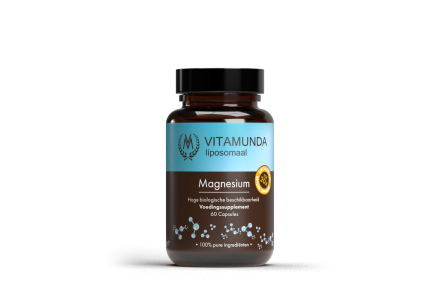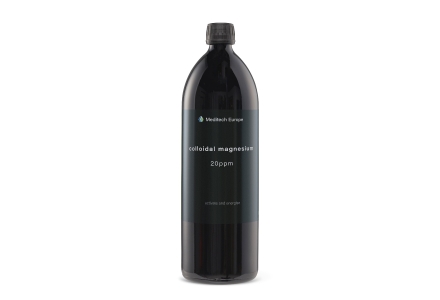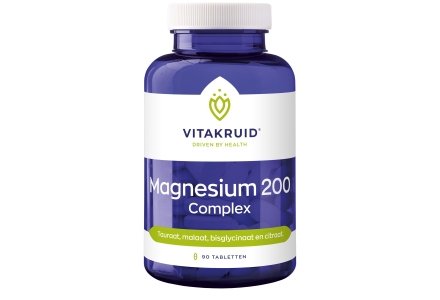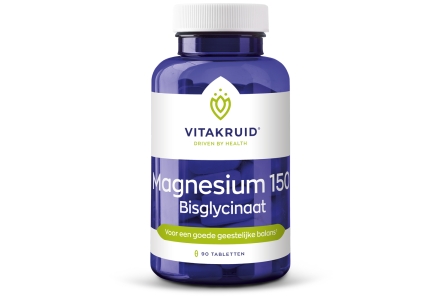
Magnesium is an essential mineral that is crucial for various bodily functions. It plays a role in over 300 enzymatic reactions in our body and is involved in processes such as muscle contraction, nerve function, bone health, and maintaining a normal heart rate. It is therefore of great importance to incorporate an adequate amount of magnesium into your diet. In this article, we will delve into the different forms of magnesium, how to choose the best form, the recommended daily intake, the difference between organic and inorganic bound magnesium, what to consider when buying a magnesium supplement, and some frequently asked questions.
What is magnesium, and why is it important?
Magnesium is a mineral naturally found in foods such as nuts, seeds, leafy greens, and whole grains. It plays a crucial role in numerous biological processes in our body. Here are some reasons why magnesium is so important:
- Muscle Function: Magnesium is essential for muscle contraction and relaxation. It helps prevent muscle cramps and supports overall muscle health.
- Nervous System: The mineral is involved in the transmission of nerve impulses and can help reduce anxiety and stress.
- Energy Production: Magnesium is needed for the production of ATP (adenosine triphosphate), the body's energy currency.
- Bone Health: The mineral is involved in the formation and maintenance of healthy bones.
- Heart Health: Magnesium is vital for maintaining a normal heart rate and regulating blood pressure.
- Blood Sugar Regulation: It can help maintain a healthy blood sugar level.
Now that we know why magnesium is so important, let's take a look at the different forms of magnesium supplements available and how they differ.
What forms of magnesium are there?
Magnesium Citrate
Properties: Magnesium citrate is one of the most common and well-absorbed forms of magnesium. It is quickly absorbed by the body and has few side effects, such as possible digestive issues.
Magnesium Bisglycinate
Properties: This form of magnesium is very well tolerated and has little impact on the digestive system. It is an excellent choice for people with a sensitive stomach.
Magnesium Glycerophosphate
Properties: Magnesium glycerophosphate has high bioavailability and is well absorbed. It may be beneficial for those who have difficulty swallowing tablets.
Magnesium Gluconate
Properties: Magnesium gluconate is another well-absorbed form. It is suitable for people with a higher need for magnesium, such as pregnant women.
Magnesium Malate
Properties: Magnesium malate may be beneficial for people needing extra energy, as it is involved in energy production in the body.
Magnesium Taurate
Properties: This form of magnesium can help regulate blood pressure and support cardiovascular health.
Magnesium Lactate
Properties: Magnesium lactate can help maintain a healthy stomach acidity and is therefore well tolerated by people with a sensitive stomach.
Magnesium Complex
Properties: Magnesium complexes contain multiple forms of magnesium and offer a wide range of benefits. They may be suitable for general use.
Colloidal Magnesium
Properties: Colloidal magnesium is a liquid form of magnesium easily absorbed by the body. It is often used for topical applications.
Magnesium Oxide
Properties: Magnesium oxide is the least well-absorbed form of magnesium and can have a laxative effect in higher doses. It is usually used as a laxative rather than a supplement.
It's important to note that choosing the right magnesium form depends on your specific needs and tolerance. Some forms are better suited for certain purposes than others.
How to choose the best magnesium form?
Choosing the best magnesium form depends on several factors:
Purpose: What is your specific goal in taking magnesium? Do you want to reduce muscle cramps, increase your energy levels, or support your cardiovascular health?
Tolerance: Some people have sensitive stomachs and may tolerate magnesium forms with fewer side effects, such as magnesium bisglycinate or magnesium lactate.
Bioavailability: Some forms of magnesium are better absorbed than others. Consult with a healthcare provider if you're unsure which form is most suitable for you.
How much should you take daily?
The recommended daily allowance (RDA) for magnesium varies depending on age, gender, and other factors. Generally, the RDA ranges between 300 and 420 milligrams for adults. It's important to discuss your specific needs with a healthcare provider, as some people may require more magnesium than others.
The difference between organic and inorganic bound magnesium
Magnesium supplements can be organically or inorganically bound. Organically bound magnesium is often better absorbed and tolerated by the body. Examples of organic magnesium compounds include magnesium citrate, magnesium bisglycinate, and magnesium malate. Inorganically bound magnesium, such as magnesium oxide, generally has lower bioavailability and can have a laxative effect at higher doses.
What to consider when purchasing a magnesium supplement?
When buying a magnesium supplement, it's essential to consider the following:
Quality: Choose a reputable brand that uses high-quality ingredients and complies with applicable supplement standards.
Dosage: Check the dosage and ensure it matches your needs and the recommended daily amount.
Type of magnesium: Select the magnesium form that best aligns with your goals and tolerance.
Added ingredients: Check for any added ingredients that you may be sensitive to or that can support your health goals.
Reliable source: If you're looking for a reliable supplement provider, consider Meditech Europe. Meditech Europe offers high-quality supplements and orthomolecular therapeutic support to help you achieve your health goals. Contact us at info@meditecheurope.nl or call +31527 292 331 for more information and personalized advice. Your health is our priority.
FAQ
Can I combine different types of magnesium?
Yes, it is generally safe to combine different forms of magnesium as long as you do not exceed the recommended dosages. Some people choose to combine, for example, magnesium citrate and magnesium bisglycinate to harness the benefits of both.
How quickly can I expect results after starting magnesium supplements?
The speed of results can vary depending on the form of magnesium and your individual needs. Generally, some people may notice improvements within a few days to a week, while others may take longer to experience the benefits. Magnesium citrate and magnesium bisglycinate are typically absorbed faster than magnesium oxide, which may yield slower results.
Are there foods that are rich in magnesium?
Yes, there are plenty of foods that are rich in magnesium, including:
Nuts and seeds, such as almonds, cashews, and sunflower seeds. Leafy greens, like spinach, kale, and Swiss chard. Whole grains, including brown rice, oats, and quinoa. Legumes, such as black beans, chickpeas, and lentils. It's a good idea to incorporate magnesium-rich foods into your diet to supplement your magnesium intake.
Conclusion
Magnesium is an essential mineral with numerous health benefits. Choosing the right magnesium form and following recommended dosages is crucial to fully benefit from this mineral. Always consult a healthcare provider before starting any supplements to determine your specific needs. Meditech Europe is ready to advise you and offer high-quality supplements to support your health goals. Contact us at info@meditecheurope.nl or call +31527 292 331 for more information and personalized advice. Your health is our priority.









